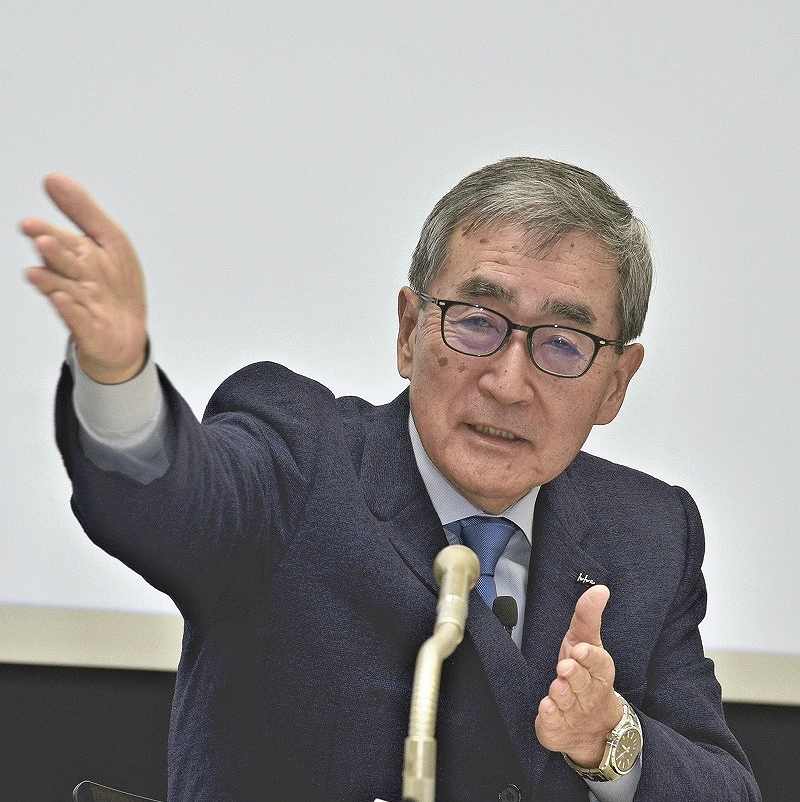
Eisai Co. CEO Haruo Naito selects a questioner in Tokyo on Saturday.
18:07 JST, January 8, 2023
TOKYO/WASHINGTON — A new drug for the treatment of Alzheimer’s disease continues to draw attention after the U.S. Food and Drug Administration’s recent accelerated approval of lecanemab.
Jointly developed by Eisai Co. of Japan and Biogen Inc. of the United States, lecanemab could likely be approved in Japan within this year, but there are many issues to be addressed. Among these are establishing a testing system to find patients eligible for the drug and the high cost of the medication.
Lecanemab removes from the brain a substance believed to cause Alzheimer’s disease, delaying the decline of cognitive functions.
“This great news is the dawn of the future,” said Morio Suzuki, the representative director of the Alzheimer’s Association Japan, in a statement released after the FDA approved the drug for use in the United States on Friday. “I sincerely hope the drug will be approved quickly in Japan as well and become available for an appropriate, worry-free price.”
Unlike conventional Alzheimer’s drugs that aim to temporarily improve symptoms, lecanemab works to remove amyloid beta, a protein believed to be the cause of Alzheimer’s disease. It does not restore damaged neurons or cognitive functions that have already deteriorated, however, so it is intended for “patients with mild cognitive impairment or mild dementia stage of disease,” according to a press release from the two pharmaceutical companies.
The results published last autumn of a final clinical trial showed the severity of dementia symptoms changed with lecanemab in comparison to patients on a placebo. A group administered with an infusion of lecanemab every other week for 18 months had changes in cognitive abilities such as memory and judgment. The results showed a 27% slower deterioration of symptoms in the lecanemab group.
This difference is equivalent to a 7½-month delay in the progression of symptoms, Eisai explained.
“Verification is necessary,” said Atsushi Iwata, a director of the Japan Society for Dementia Research who also heads the neurology department of the Tokyo Metropolitan Institute for Geriatrics and Gerontology. “But administering the drug over a longer period could possibly extend the delay period by a year for some patients, so they can be able to do household chores and take care of themselves.”
Brain hemorrhage risks
Some side effects have also been reported with lecanemab. Of the patients treated with the drug, 12.6% experienced brain swelling, and 17.3% had small hemorrhages on the brain surface.
The FDA said in a statement that “serious and life-threatening events rarely may occur” with use of the drug while warning of adverse reactions such as headache and nausea.
According to some U.S. media reports, three people in the about 1,600 patients who continued to receive lecanemab after the clinical trials died of brain hemorrhage. Eisai explained that anticoagulation treatment was involved in these cases, thus the deaths could not be attributed to lecanemab.
In the summer of 2021, the FDA gave accelerated approval to aducanumab, another drug that removes amyloid beta. However, doubts were raised over the efficacy of the drug that had been mainly developed by Biogen.
In Japan, an expert panel of the Health, Labor and Welfare Ministry later in the same year decided to forgo its approval, citing “the difficulty of determining the efficacy based on current data.” In Europe, the approval application has been withdrawn.
“Caution is necessary for using lecanemab along with anticoagulants and checking side effects at facilities with specialists, but the drug can be said to be better than aducanumab in terms of efficacy and safety,” said Kenjiro Ono, a neurology professor at Kanazawa University and an expert on dementia. “There’s a possibility that lecanemab will be approved in Japan as well.”
Domestic use faces hurdles
“The new drug has the potential to enable patients to maintain cognitive function and daily life for a longer period of time,” Eisai CEO Haruo Naito said at a press conference in Tokyo on Saturday.
While the expectations are high among patients and their families amid Japan’s graying society, challenges are also emerging.
Lecanemab is an antibody-drug made through genetic recombination technology, thus it is expensive to produce. It will cost $26,500 (about ¥3.5 million) per patient per year in the United States. It will also likely be in the millions of yen in Japan.
The Japanese Psychogeriatric Society and five other related academic societies predict that, once lecanemab is approved for domestic use, tens of thousands of people per year will use the drug in Japan. If this treatment is to be covered by public health insurance, it is feared that it would squeeze public finances.
Top Articles in Business
-

Prudential Life Insurance Plans to Fully Compensate for Damages Caused by Fraudulent Actions Without Waiting for Third-Party Committee Review
-

Narita Airport, Startup in Japan Demonstrate Machine to Compress Clothes for Tourists to Prevent People from Abandoning Suitcases
-

Japan, U.S. Name 3 Inaugural Investment Projects; Reached Agreement After Considerable Difficulty
-

Toyota Motor Group Firm to Sell Clean Energy Greenhouses for Strawberries
-

SoftBank Launches AI Service for Call Centers That Converts Harsh Customer Voices into Softer Voices
JN ACCESS RANKING
-

Japan PM Takaichi’s Cabinet Resigns en Masse
-

Japan Institute to Use Domestic Commercial Optical Lattice Clock to Set Japan Standard Time
-

Israeli Ambassador to Japan Speaks about Japan’s Role in the Reconstruction of Gaza
-

Man Infected with Measles Reportedly Dined at Restaurant in Tokyo Station
-

Videos Plagiarized, Reposted with False Subtitles Claiming ‘Ryukyu Belongs to China’; Anti-China False Information Also Posted in Japan























